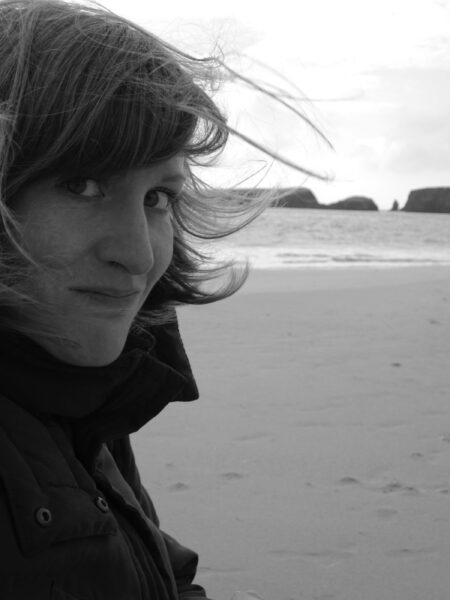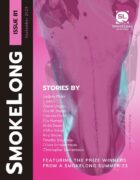First of all, congratulations on winning the SmokeLong Summer Prize! “And so we shall only be glad” is a story about mothers and daughters, or at least one mother and her young daughters—how their lives are intensely intwined, and how they are also inevitably separate. The setting is a moment of great emotional pain. All women are daughters; many are mothers. Can you talk a bit about your thoughts on those roles in the world? In the story?
Intensely intertwined is a good way to describe an early mother-child relationship. Understanding that separation has occurred at birth is easy in a visual sense, but in a bodily sense it isn’t always so simple, for mother or child. Traces remain—cells, feelings, memories, trauma. The guilt this mother feels for needing to be alone while her children cry outside the bathroom door might be universally recognizable, but during those first years of motherhood it can feel deeply wrong to decide to close a door between parts of a fragmented self. The bathroom in the story could also be womb. Let me in / come back—the lifelong, mutual cry. And the boundary-setting that must follow is reluctant, lifelong work.
The story riffs on this first scene when they are shut outside the father’s heart. The shapeshifting challenges of new parenthood are multitudinous. It’s not only one into two (mother and child): Becoming a family can be an uncomfortable, communal metamorphosis.
Something that is rarely discussed but that I think about a lot is how the biological relationship between mother and child begins as a loss, a parting, but for everyone else a child is an addition, a gain. We still have so far to go, medically and socially, to incorporate meaning into the more physical aspects of preparation for motherhood. Why make existential transformation so unexpected for a new mother by focusing on cot blankets and breast pumps? It doesn’t seem fair.
By contrast, the literary world has recently embraced more philosophical understandings of motherhood: I found Lucy Jones’s Matrescence (nonfiction) and Alex Hyde’s Violets (fiction) so impressive. Necessary works.
The story turns repeatedly on the word “glad,” used in unexpected ways. It’s prominent in the title, and the narrator reiterates that she is “glad” that the young daughters see her cry; she feels “gladness” as she drives down the road; she will never be “glad enough” to drink straight from the bottle, etc. What was the path that led you to that as the centering word of the story?
Shame, rage, terror, anxiety, exhaustion, alarm, exasperation, and regret can be impossible to express aloud, or even internally, without creating a guilt-loop of burn-out and distress. For many mothers, to ask for help is also to risk losing the care of the child. On top of this, the overriding modern narrative assigns a certain smugness to the happily procreating, so mothers can’t gush about fulfillment either. Certainly not joy. Quietly-glad-despite-it-all is probably acceptable. When I first played with this story draft, there were so many taboo emotions to cover that a question formed: What if ‘glad’ had to stand in for all the feelings / adverbs? The constraint of that, as well as the word limit, funneled the story into its final shape and hopefully reflects society’s continued repression of motherhood experiences.
The focus of the story is this woman, in this emotional state. A lot of context is left unexplained or barely suggested, and there are spaces left unfilled between the scenes. How do you decide what to include and what to leave out in a story?
I don’t decide consciously when I’m writing it. That’s partly why I enjoy workshop feedback. It amazes me to see how different readers experience the page because it’s often when I think I’ve been super clear, left nothing to the imagination, that I’ve in fact left gaps far too wide. My family wouldn’t be surprised to hear that. I’ve noticed recently that I’ll start a sentence pointing in a random direction and everyone’s eyes go there but I haven’t yet said what I’m describing. It might be the window, the trees, someone down the road, or it might be something several countries away or in the distant past. I regularly assume everyone can see the inside of my head and I live in a chronic state of surprise—and relief!—that they can’t.
What draws you to flash fiction? This story feels almost like an extended prose poem–do you also work in other genres?
That’s interesting about the prose poem. Most of my writing, including long-form, starts off as a poem. Flash is something I’ve only turned to this year, but I have always admired its precision, its particular concentration of words. I finished the final revisions of my novel in the spring and wanted to keep writing to distract from the process of submitting. The rigor of flash has been great for strengthening my editing decisions on the novel too. After those gappy, poem-like beginnings, I do enjoy piecing together a final form, working out what still needs to be painted in. In the final, spiraling paragraph at the train crossing, the sentence ‘Lights and horns trail behind me like one long electric tail of gladness‘ situates her on the road, driving, but only just. It’s also possible to picture her physically trailed by an electric tail of lights and horns—but then she chooses to smile at her daughter in the rearview mirror and yes. I know (this) mother boomerangs between the brink and the acceptable, time and again. She’s very capable in that regard.
Would you want to have wings? What would you do with them? Or, why might you not want them?
Oh, but I do have wings! Cultural expectation is a boggy place and using them is never easy, but writing helps me launch.



 The core workshop of SmokeLong Fitness is all in writing, so you can take part from anywhere at anytime. We are excited about creating a supportive, consistent and structured environment for flash writers to work on their craft in a community. We are thrilled and proud to say that our workshop participants have won, placed, or been listed in every major flash competition. Community works.
The core workshop of SmokeLong Fitness is all in writing, so you can take part from anywhere at anytime. We are excited about creating a supportive, consistent and structured environment for flash writers to work on their craft in a community. We are thrilled and proud to say that our workshop participants have won, placed, or been listed in every major flash competition. Community works.